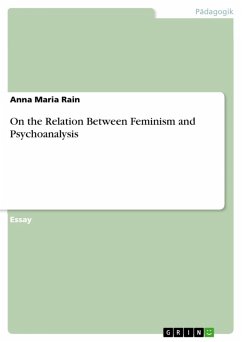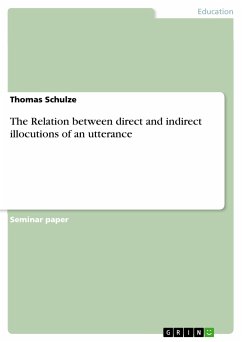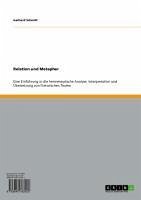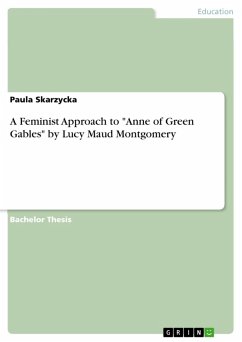
On the Relation Between Feminism and Psychoanalysis (eBook, ePUB)

PAYBACK Punkte
0 °P sammeln!
Essay aus dem Jahr 2009 im Fachbereich Didaktik für das Fach Englisch - Landeskunde, Trinity College Dublin - The University of Dublin (Department of English), Veranstaltung: Critical and Cultural Theory, Sprache: Deutsch, Abstract: In her article "Feminism: A Movement to End Sexist Oppression", Bell Hooks claims that the major problem within feminist discourse is the "inability to either arrive at a consensus of opinion about what feminism is or accept definition(s) that could serve as points of unification". Without agreed upon definitions, feminism lacks a sound foundation on which to cons...
Essay aus dem Jahr 2009 im Fachbereich Didaktik für das Fach Englisch - Landeskunde, Trinity College Dublin - The University of Dublin (Department of English), Veranstaltung: Critical and Cultural Theory, Sprache: Deutsch, Abstract: In her article "Feminism: A Movement to End Sexist Oppression", Bell Hooks claims that the major problem within feminist discourse is the "inability to either arrive at a consensus of opinion about what feminism is or accept definition(s) that could serve as points of unification". Without agreed upon definitions, feminism lacks a sound foundation on which to construct a theory or engage in overall meaningful praxis. Presumably it is also due to this internal vagueness in definition that feminism turned to other, more or less related, schools of thought such as Marxism, science studies or psychoanalysis in order to stabilize itself in the academic world. From all liaisons with the above mentioned (and many other) analytic fields that feminism entered, I find psychoanalysis to be the most natural, as feminism, for all its difficulties in definition, explicitly aims to end sexist oppression4. In order to do so, it needs to closely analyse sex, sexes, and gender(s), for which it lacks a methodological apparatus of its own. Whereas in other disciplines that feminists have tried to reshape for their purposes (i.e. sciences more concerned with societal problems, such as politics) the argument for gender neutrality or irrelevance can be more easily sustained by traditionalists, the advantages of a feminist psychoanalytic approach are substantial, as Nancy Chodorow5 argues: [...]
Dieser Download kann aus rechtlichen Gründen nur mit Rechnungsadresse in A, B, BG, CY, CZ, D, DK, EW, E, FIN, F, GR, HR, H, IRL, I, LT, L, LR, M, NL, PL, P, R, S, SLO, SK ausgeliefert werden.













